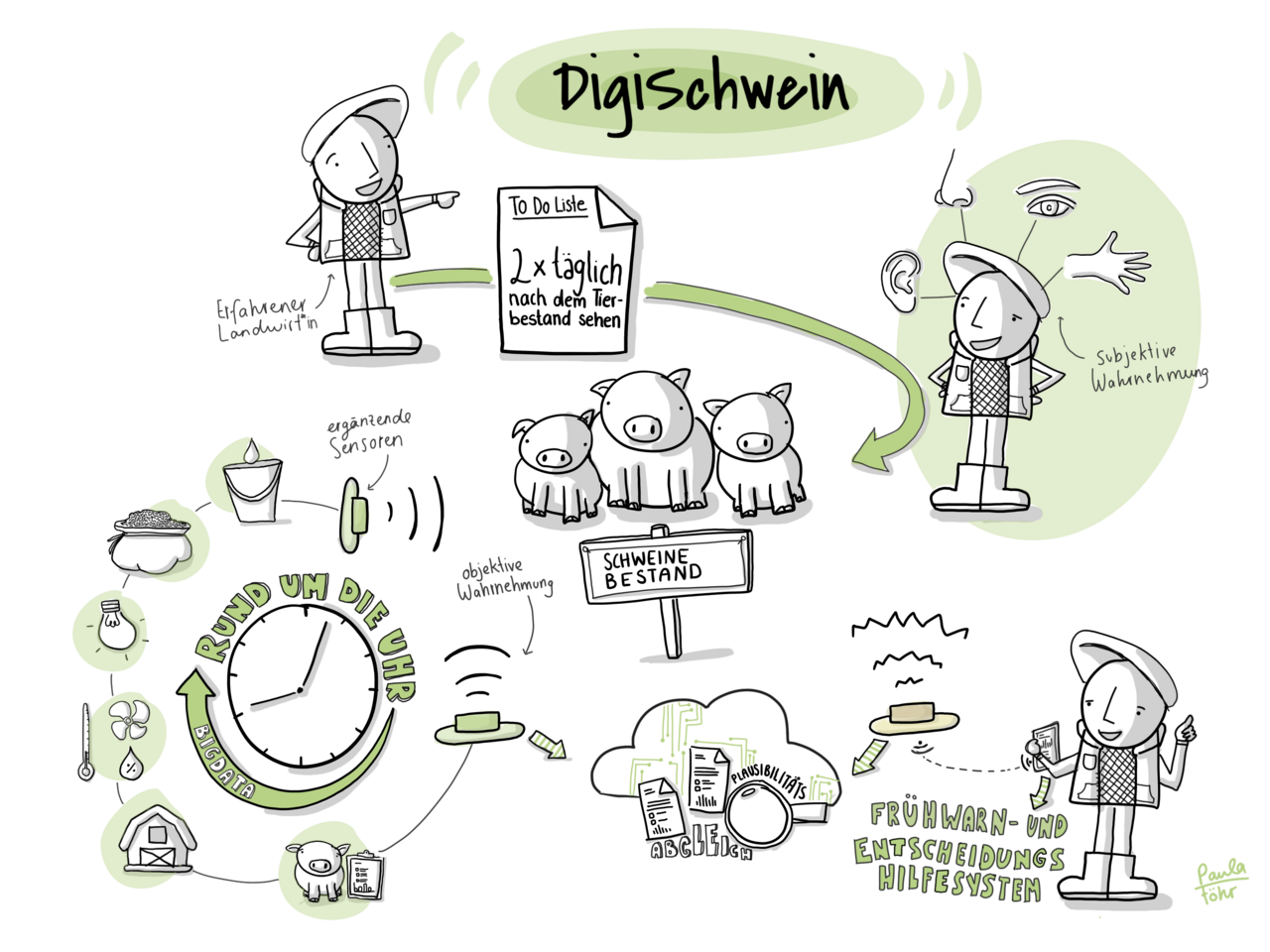Project
DigiSchwein

Cross innovation and digitisation in animal-friendly pig farming, taking into account the protection of resources - "DigiSchwein" advise, qualify and promote
The experiment field "DigiSchwein" pursues the strategic goal of further developing and making practicable the opportunities of digitization, knowledge transfer and transformation for the broad agricultural practice with a focus on animal-friendly and resource-saving pig farming (ecological / conventional).
Background and Objective
A specific developed data model - the farm management software "DigiSchwein" - is intended to support pig farmers in their daily work with the animals. This should be done in form of an early warning system, through continuously recorded and targeted evaluated sensor data. The evaluation focuses on current and practice-oriented problems of modern pig farming: plausibility analyzes of existing sensor technology; decision aids for the early detection of illness, keeping of undocked animals / reduction of tail biting; monitoring system for birth management; nutrient flows - digital transparency in the pigsty. The cooperation of the partners from science and industry, with a constant exchange of knowledge, focuses on the further development and diffusion of digitization into broad agricultural practice.
All in all, the "DigiSchwein" early warning system aims to promote animal welfare, increase resource efficiency and protect the environment through nutrient reduction. By using modern technologies, sustainable agriculture will be further developed.
Target Group
The (interim-)results of the project are to be transferred to the outside, to the general public and agricultural practice in the form of knowledge and technology transfer. The strong networking of the consortium ensures that the focus is on the improvement of agricultural practice with regard to efficiency and sustainability of the use of operating resources, employment of labor, documentation, resource conservation and nutrient use during the entire project period and beyond. The use of the digital early warning system will be applied in 2-3 selected farms. The agricultural education centre in Echem has over 2000 agricultural apprentices in the external training who can use the digital system.
Approach
The consortium consists of interdisciplinary experts from agriculture, husbandry technology, computer science/IT institutions, agricultural lighthouse farms and universities. The partners of the project work out results in nine subprojects / work packages (AP):
WP 1: Coordination / Organisation
WP 2: Digitization, Modeling, Data Management / Analysis
WP 3: Plausibility analysis of existing technology/sensors and data
- Procurement, installation and calibration of sensor technology in test stables
- Data collection with sensor technology and manual animal observation
- Development of theoretical plausibility analyses
- Verification of theoretical plausibilities in experimental stables
- Transfer of the plausibilities into the assistance system for pig farmers
- Scientific transfer of the results to the public.
WP 4: Decision-making aids for early detection of disease
WP 5: Keeping uncoped pigs: techniques for early detection of tail biting and prevention
AP 6: Monitoring system for birth management
AP 7: Nutrient Flows - Digital Transparency in the Pigsty
WP 8: Evaluation by expert advisory boards, digital transformation
WP 9: Knowledge Transfer, Digital Transformation, Cross Innovation
Thünen-Contact

Involved Thünen-Partners
Involved external Thünen-Partners
- Landwirtschaftskammer Niedersachsen
(Oldenburg, Uelzen, Hannover, Deutschland) -
Stiftung Tierärztliche Hochschule Hannover
(Hannover, Deutschland) - Georg-August-Universität Göttingen
(Göttingen, Deutschland) -
Carl von Ossietzky Universität Oldenburg
(Oldenburg, Deutschland) - OFFIS e.V.
(Oldenburg, Deutschland)
Funding Body
-
Federal Ministry of Food und Agriculture (BMEL)
(national, öffentlich)
Duration
2.2020 - 8.2024
More Information
Project funding number: 28DE109D18
Project status:
ongoing
Publicationd on the project
- 0
Lieboldt M-A, Reinkensmeier J, Gómez JM, Hölscher P, Kemper N, Traulsen I, Drücker H (2024) "DigiSchwein". Ratgeber Schweinehaltung(April 2024):30-31
- 1
Lieboldt M-A, Sagkob S, Reinkensmeier J, Marx Gómez J, Hölscher P, Kemper N, Traulsen I, Drücker H (2023) DigiSchwein - Cross Innovation und Digitalisierung in der tiergerechten Schweinehaltung unter Berücksichtigung des Ressourcenschutzes [online]. Leistungs- und Qualitätsprüfungen sowie Projekte in der Tierhaltung : Jahresbericht 2022/2023:128-131, zu finden in <https://www.lwk-niedersachsen.de/services/download.cfm?file=40098> [zitiert am 28.08.2023]
- 2
Lieboldt M-A, Reinkensmeier J, Marx Gómez J, Hölscher P, Kemper N, Traulsen I (2023) Smart Pig Farming: Digitale Assistenzsysteme zur automatisierten Tierbeobachtung in der Schweinehaltung : Ein Blick in die Praxis und das Verbundprojekt Experimentierfeld "DigiSchwein". Rundschau Fleischhygiene Lebensmittelüberwachung 75(2):47-51
- 3
Lieboldt M-A, Sagkob S, Reinkensmeier J, Marx Gómez J, Hölscher P, Kemper N, Traulsen I, Drücker H, Diekmann L (2021) Experimentierfeld DigiSchwein : Entwicklung eines sensorbasierten Frühwarn- und Entscheidungshilfesystems für die Schweinehaltung. Lecture Notes Informatics - Proceedings P-309:391-396

![[Translate to English:] [Translate to English:]](/media/_processed_/3/6/csm_Hintergrund-Ausschnitt1_9daaef6b89.jpeg)
![[Translate to English:] [Translate to English:]](/media/_processed_/3/6/csm_Hintergrund-Ausschnitt1_0bd7111163.jpeg)
![[Translate to English:] Logo des Bundesministerium für Ernährung und Landwirtschaft](/media/allgemein/logos/BMEL_Logo.svg)